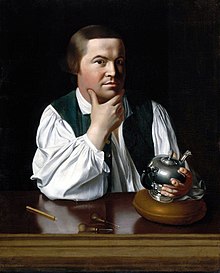
Back Paul Revere Afrikaans بول ريفير Arabic بول ريفير ARZ Pol Revir Azerbaijani Пол Ривиър Bulgarian Paul Revere Breton Paul Revere Catalan Paul Revere (revolucionář) Czech Paul Revere Danish Paul Revere (Freiheitskämpfer) German
Paul Revere | |
|---|---|
 John Singleton Copley, Portrait of Paul Revere. c. 1768–1770, Museum of Fine Arts, Boston | |
| Born | January 1, 1735 (O.S.: December 21, 1734) |
| Died | May 10, 1818 (aged 83) Boston, Massachusetts, U.S. |
| Occupation(s) | Silversmith, colonial militia officer |
| Political party | Federalist |
| Spouses |
|
| Children |
|
| Father | Apollos Rivoire |
| Signature | |
Paul Revere (/rɪˈvɪər/; December 21, 1734 O.S. (January 1, 1735 N.S.)[N 1] – May 10, 1818) was an American silversmith, military officer and industrialist who played a major role during the opening months of the American Revolutionary War in Massachusetts, engaging in a midnight ride in 1775 to alert nearby minutemen of the approach of British troops prior to the battles of Lexington and Concord.
Born in the North End of Boston, Revere eventually became a prosperous and prominent Bostonian, deriving his income from silversmithing and engraving. During the American Revolution, he was a strong supporter of the Patriot cause and joined the Sons of Liberty. His midnight ride transformed him into an American folk hero, being dramatized in Henry Wadsworth Longfellow's 1861 poem, "Paul Revere's Ride". He also helped to organize an intelligence and alarm system to keep watch on the movements of British forces. Revere later served as an officer in the Massachusetts Militia, though his service ended after the Penobscot Expedition, one of the most disastrous American campaigns of the American Revolutionary War, for which he was absolved of blame.
Following the war, Revere returned to his silversmith trade. He used the profits from his expanding business to finance his work in iron casting, bronze bell and cannon casting, and the forging of copper bolts and spikes. In 1800, he became the first American to successfully roll copper into sheets for use as sheathing on naval vessels.
- ^ Gill 1891, pp. 10–11.
- ^ Fischer 1994, p. 297.
Cite error: There are <ref group=N> tags on this page, but the references will not show without a {{reflist|group=N}} template (see the help page).